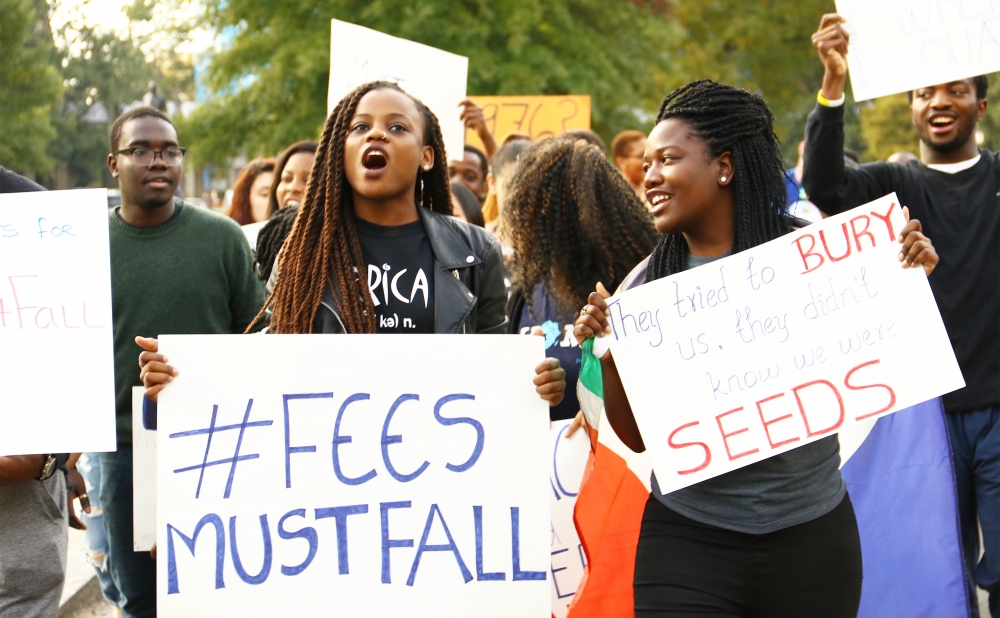Yesterday, higher education minister, Blade Nzimande recommended that South African universities consider an eight per cent tuition fee increase for the 2017 academic year. While the decision to accept the recommendation is at the discretion of each institution, protesting students have voiced their anger at the announcement. The announcement follows numerous protests that ensued last week at universities throughout the country. Last week, the University of Cape Town, Witwatersrand, and Stellenbosch were periodically disrupted as students resumed the #FeesMustFall protest, which was initiated in 2015. The students are calling for free tertiary education and for an end to the outsourcing of university cleaners from private companies.
To unpack Nzimande’s recommendation, VOC chatted to the vice dean of the Faculty of Education at the University of Stellenbosch, professor Aslam Fataar.
Fataar explains that given the current socio-political climate within the country, yesterday’s announcement appeared to close the divide between students, universities, and Government.
He says that while Government’s recommendation balanced both the universities requirements and students demands, which he deems to be “entirely legitimate,” the main challenge moving forward, would be selling the plan to the protesting students.
“Universities require an increase in order to function; it did not have an increase last year. This year, if universities did not have an increase, it would have been a disaster, because they would not be able to run,” Fataar states.
Fataar explains that the recommendation outlines a plan in which universities should increase their fees by up to eight per cent, to subsequently allow government to fund three categories of students.
The categories are as follows; NSFAS students whose parents earn under 120 000 per annum will not pay fees, those earning under 600 000 won’t be paying the fee increase, and those earning over 600 000 will pay the fee increase.
“That I think strikes a balance; it provides student who can’t afford access with access and allows universities to continue running efficiently,” he adds.
In light of the manner in which the 2015 #FeesMustFall protests were conducted, Fataar says that in the coming days there will be much anticipation as to how the protests will ensue.
He says that the action adopted by the protesting students will be dependent on the decision that each universities take on the eight per cent proposal.
“When the universities decide, then there is going to be enormous contesting, conversation, and a line of persuasion that persuades students about its viability.”
He says that where universities are able to successfully persuade students, the decision will be able to hold. But, where it will be met with contestation, it may result in damages to the academic year.
As a member of staff at the University of Stellenbosch, he notes that an eight per cent increase would only provide the university lee-way to very narrowly break-even.
He further notes that given the fact that the government funding curve for tertiary education subsidies, over the last 25-years, has shown a downward trend – a shortfall which government needs to address.
“It is out of sync with how developing countries fund their university systems, with something like two per cent of their entire budget; we are funding universities with something like 0.7 per cent of our entire budget. So, we have been under-funding,” he explained.
While, the 2015 protests resulted in thousands of rands worth of damage at numerous universities within the country, Fataar asserts that universities are not in a position to cater to additional expenditure.
“That would be money that we simply do not have, the [costs of] restoration would have to come from sources that the university does not have; donor funding and outside funding. In the event that we do not get that funding, we simply are unable to restore the facilities.”
In order to facilitate peaceful protesting, he says that universities need to guarantee students the right to protest, in which ever manner they deem fit, but to ensure that protests be conducted peacefully and within the bounds of law.
He says that if protests are not conducted peacefully, then universities are forced to intervene, since a university cannot afford the disruption of classes or the damage to property.
“When classes are disrupted and buildings are ransacked then the universities have to call in the police or private security. Once that happens, then skirmishes between protestors and police happen. This puts us in a position where we cannot logically and rationally address the situation,” Fataar continued.
VOC






 WhatsApp us
WhatsApp us 

